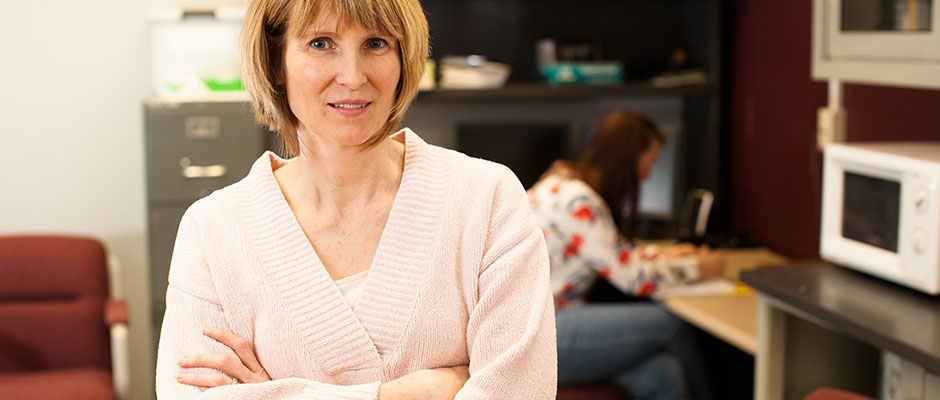
ACT now to avoid depression and anxiety
Rost discovered that late-stage ovarian cancer patients achieved a better quality of life when they participated in a modern therapy called Acceptance and Commitment Therapy (ACT) rather than traditional therapy. By learning to accept difficult thoughts and emotions, the women were better able to cope with their situation and less likely to suffer from anxiety and depression. Rost worked with MSU Associate Professor of Psychology Dr. Erin Buchanan and researchers from the University of Mississippi, University of Nevada-Reno and Washington University Medical School on the project.
Rost became interested in ACT her last year in graduate school at the University of Kansas, when she was working with patients with cancer and chronic pain conditions. The traditional therapy at the time focused on patient behavior and changing the content of thoughts.
“There was nothing to change about their thoughts, as they were being realistic in their fears and concerns about their health conditions,” she noted. “Telling them to think differently about their situation felt like it invalidated their whole experience.”
Rost added that in the short run cancer patients might feel better avoiding thoughts and cues about their health status, but if they do not think about it, they miss out on opportunities to engage in meaningful activity such as spending time with family, addressing relationships, and investigating and planning health-care options and end-of-life outcomes.
Accept, commit, repeat
The first step Rost uses during ACT is to learn what strategies the patient has tried in order to cope with the situation and whether the actions have worked. If the individual still feels bad, Rost takes a values inventory to find out what is most important to the patient, and then she determines whether that person has been living in a way that matches his or her values. For example, if the relationship with the patient’s friends is most important, what is that individual doing on a day-to-day basis to build these bonds? Rost stressed that even if the individual feels sad or mad and being connected is hard due to deteriorating health, the patient must commit that this is what he or she wants.
“Most end-stage cancer patients move quickly emotionally and get in there and make changes in a hurry.” Dr. Rost
Rost recalls working with a patient who had end-stage ovarian cancer and was married with kids living outside the home. The woman was so invested in never feeling bad that she put a towel over her head during treatment so she would not see other sick people. She stayed in her room and would not answer the phone, which cut her off from her social support and made her life “smaller.” ACT enabled the woman to have meaningful interactions with her family at a time when that really mattered.
Restoring a sense of self
Referring to Rost’s research, Dr. Bob Jones, Missouri State University psychology professor, said one of the few moments in people’s lives when you can make changes in the way they see themselves and treat those around them is when they have cancer.
“Cancer changes everything for all of us. We are faced with our mortality. Managing this transformation can be incredible. People are able to be who they are, living to their full potential.” — Dr. Bob Jones
Kirby Williams, an MSU graduate student in clinical psychology from Grove, Oklahoma, shares Rost’s interest in health psychology. Rost helped Williams with the research for her senior honors thesis on diabetes care management in undergraduate college students. After working with Rost as an undergraduate student, Williams plans to pursue a Ph.D. in psycho-oncology.
“Dr. Rost cares about community and is passionate about health. She wants to make a difference in people’s lives. I am lucky to have found her,” she said.


Thanks so much, Dr. Rost. You have proven that people are stronger than they think. Thank you for helping them to focus on what means most, and bringing fulfillment and happiness to them……msc